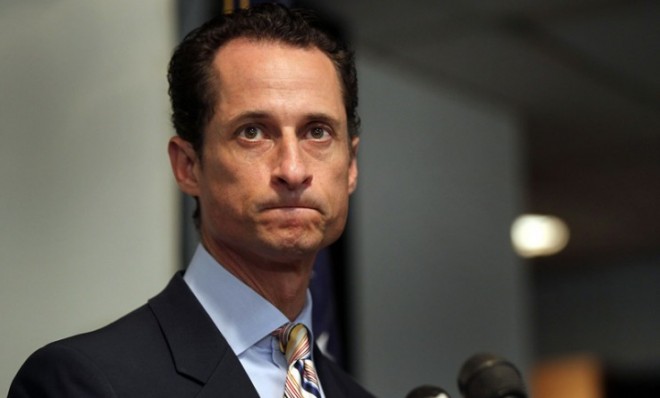5 things politicians shouldn't do on social media
Our elected officials can tweet the darnedest things


A free daily email with the biggest news stories of the day – and the best features from TheWeek.com
You are now subscribed
Your newsletter sign-up was successful
Social media tools like Facebook and Twitter have allowed politicians to interact with their constituents to an unprecedented degree. But with great social media power comes great social media responsibility, if controversies like Anthony Weiner's tweetgate are any indication. Here, a historical guide to what politicians shouldn't do on social media:
1. "Like" obscene pages
That little blue thumb button may look inviting, but click it with discretion — you never know when your "Likes" will come back to haunt you. Such was the fate of Jersey City Assemblyman Charles Mainor, who got into a bit of hot water after a constituent complained that Mainor "Liked" inappropriate Facebook pages such as "Big Bootie Freaks" and "You Got Knocked The Fck Out Man," a page that posts videos of physical assault. The assemblyman later admitted to liking You Got Knocked The Fck Out Man, but claimed that Big Bootie Freaks must have ended up in his favorites by accident. "Listen, I love women, but it shouldn't be on there, but I don't know how to get it out," Mainor said, adding that he believes he was unfairly targeted by people opposed to the gun-control legislation he supports.
The Week
Escape your echo chamber. Get the facts behind the news, plus analysis from multiple perspectives.

Sign up for The Week's Free Newsletters
From our morning news briefing to a weekly Good News Newsletter, get the best of The Week delivered directly to your inbox.
From our morning news briefing to a weekly Good News Newsletter, get the best of The Week delivered directly to your inbox.
2. Tweet a crotch shot
No matter how many youthful coeds are clamoring for them, do not send any suggestive photos of yourself (or your body parts) over Twitter (or, for that matter, any other medium). If you succumb to the temptation to tweet a photo of your junk, you won't be the first — Rep. Anthony Weiner of New York lost his job and a good chunk of his credibility in 2011 after he tweeted a photo of his underwear-clad crotch to a Seattle woman.
3. Tweet to your secret daughter
When Rep. Steve Cohen of Tennessee was caught tweeting at a 24-year-old model during the State of the Union, people feared it was Weinergate all over again. But the truth behind the tweets led to a different piece of scandalous information. Cohen initially said that the girl with whom he was exchanging messages ending in "#ilu" (short for "I love you") was a family friend, but later revealed that she was his secret daughter from a previous relationship. He added that he only learned of her existence a few years ago.
A free daily email with the biggest news stories of the day – and the best features from TheWeek.com
4. Declare an early victory
More than a month before Election Day in 2010, Joe Miller, the GOP's official candidate in Alaska for the Senate, took to tweeting his chickens before they hatched, claiming to be "doing some house hunting" and "picking out some office furniture" while on a trip to D.C. The tweets were soon deleted, but they weren't forgotten, especially after Miller was defeated in the general election by a write-in campaign mounted by his Republican primary rival, incumbent Lisa Murkowski.
5. Make late-night Twitter typos
If you're not communicating with secret daughters or secret lovers, Twitter can still be a major embarrassment: Just ask Scott Brown. When the former Massachusetts senator launched into a series of strange tweets one night in late January, the press was alarmed. The questionable tweets were mostly replies to haters, in which he frequently wrote, "whatever." But one tweet, a confounding "Bqhatevwr," was so inexplicable that it started a worldwide trending topic. Brown denies that alcohol was involved, and claims he was just learning the Twitter ropes when he "pocket-tweeted." Bqhatevwr, Scott… we'll take your word for it.
Samantha Rollins is TheWeek.com's news editor. She has previously worked for The New York Times and TIME and is a graduate of Northwestern University's Medill School of Journalism.
-
 Political cartoons for February 16
Political cartoons for February 16Cartoons Monday’s political cartoons include President's Day, a valentine from the Epstein files, and more
-
 Regent Hong Kong: a tranquil haven with a prime waterfront spot
Regent Hong Kong: a tranquil haven with a prime waterfront spotThe Week Recommends The trendy hotel recently underwent an extensive two-year revamp
-
 The problem with diagnosing profound autism
The problem with diagnosing profound autismThe Explainer Experts are reconsidering the idea of autism as a spectrum, which could impact diagnoses and policy making for the condition
-
 The billionaires’ wealth tax: a catastrophe for California?
The billionaires’ wealth tax: a catastrophe for California?Talking Point Peter Thiel and Larry Page preparing to change state residency
-
 Bari Weiss’ ‘60 Minutes’ scandal is about more than one report
Bari Weiss’ ‘60 Minutes’ scandal is about more than one reportIN THE SPOTLIGHT By blocking an approved segment on a controversial prison holding US deportees in El Salvador, the editor-in-chief of CBS News has become the main story
-
 Has Zohran Mamdani shown the Democrats how to win again?
Has Zohran Mamdani shown the Democrats how to win again?Today’s Big Question New York City mayoral election touted as victory for left-wing populists but moderate centrist wins elsewhere present more complex path for Democratic Party
-
 Millions turn out for anti-Trump ‘No Kings’ rallies
Millions turn out for anti-Trump ‘No Kings’ ralliesSpeed Read An estimated 7 million people participated, 2 million more than at the first ‘No Kings’ protest in June
-
 Ghislaine Maxwell: angling for a Trump pardon
Ghislaine Maxwell: angling for a Trump pardonTalking Point Convicted sex trafficker's testimony could shed new light on president's links to Jeffrey Epstein
-
 The last words and final moments of 40 presidents
The last words and final moments of 40 presidentsThe Explainer Some are eloquent quotes worthy of the holders of the highest office in the nation, and others... aren't
-
 The JFK files: the truth at last?
The JFK files: the truth at last?In The Spotlight More than 64,000 previously classified documents relating the 1963 assassination of John F. Kennedy have been released by the Trump administration
-
 'Seriously, not literally': how should the world take Donald Trump?
'Seriously, not literally': how should the world take Donald Trump?Today's big question White House rhetoric and reality look likely to become increasingly blurred
